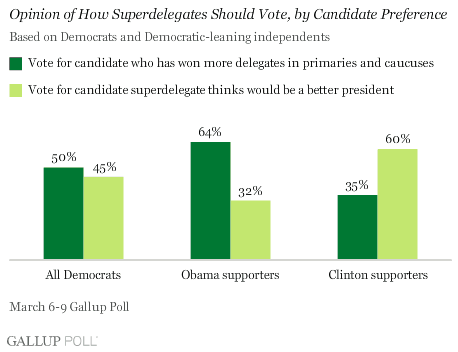PRINCETON, NJ -- The Democratic rank-and-file is fairly evenly divided between those saying superdelegates should vote for the candidate with the most delegates after all the primaries and caucuses are run, and those saying superdelegates should vote for the candidate they believe would make the better president. Clinton and Obama supporters take opposing views on the matter.

There is a real possibility the Democratic Party superdelegates -- party activists, officeholders, and elders who are free to support any candidate they choose -- will ultimately decide who the nominee is. That it is because it is unlikely that either Barack Obama or Hillary Clinton will amass enough pledged delegates in the state primaries and caucuses to clinch the nomination.
A new ║┌┴¤═° Poll, conducted March 6-9, asked Democrats how superdelegates should vote if one candidate has more delegates at the time of the convention but they believe the other candidate would be a better president. Fifty percent believe superdelegates should side with the voters and choose the leader in the delegate count, while 45% believe superdelegates should vote their consciences and cast their ballots for the candidate they think would be the better president.
Odds are Obama will have more delegates at the time of the convention, and the data suggest that Democrats are aware of this, and respond accordingly. By a 2-to-1 margin (64% to 32%), Democrats who support Obama believe superdelegates should vote for the candidate with more pledged delegates. Meanwhile, Clinton supporters take the opposing view and say by nearly the same margin, 60% to 35%, that superdelegates should vote for the candidate they think would be the better president.
Implications
Clinton's wins in the Ohio and Texas primaries eliminated the possibility of an early conclusion to the Democratic campaign, and increased the possibility of the nomination being decided at the convention in late August.
In one sense, the split over how superdelegates should vote is not surprising given that Democrats have been fairly evenly divided in their preferences between Clinton and Obama as the party's nominee for most of this year. Many Democrats are apparently tuned in to the issues and understand the implications of one outcome or another for each candidate, and thus tend to favor an approach that works in their preferred candidate's best interests.
Survey Methods
These results are based on telephone interviews with a randomly selected national sample of 528 Democrats and Democratic leaning independents, aged 18 and older, conducted March 6-9, 2008. For results based on this sample, one can say with 95% confidence that the maximum error attributable to sampling and other random effects is ┬▒5 percentage points.
Interviews are conducted with respondents on land-line telephones (for respondents with a land-line telephone) and cellular phones (for respondents who are cell-phone only).
In addition to sampling error, question wording and practical difficulties in conducting surveys can introduce error or bias into the findings of public opinion polls.
